Five Ways to Help War Victims in Ukraine. Guide to Donate to Local NGOs
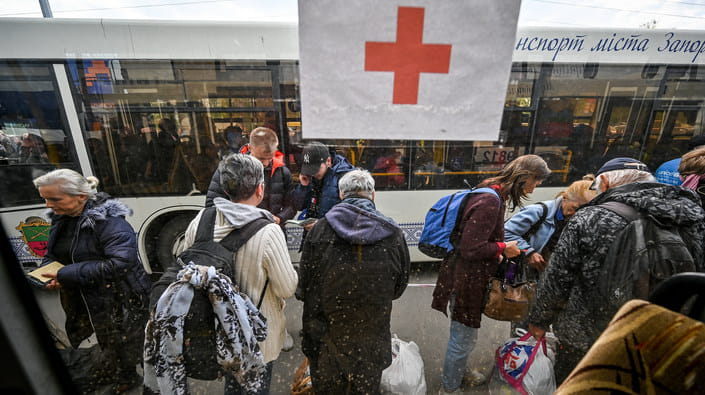
For Ukrainian humanitarian organisations, as for all Ukrainians, life is divided into "before" and "after." The full-scale invasion of Russia on 24 February has caused an explosion in the humanitarian needs of Ukrainians.
However, while supporting others, they themselves need support. The London-based independent organisation Humanitarian Outcomes has conducted research that showed that since the beginning of the Russian invasion, virtually all humanitarian aid inside Ukraine has been organised and implemented by local actors, not international organisations.
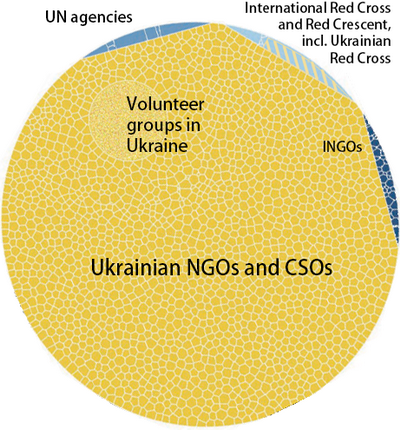
The latter include the International Committee of the Red Cross (ICRC) and other UN humanitarian agencies, which have much greater visibility abroad and attract funds from Western donors.
But as this study discovered, these humanitarian giants have minimal field presence in war-torn Ukraine, compared with local organisations. Despite raising significant sums of money in the first days and weeks of the crisis, international organisations were unable to provide rapid injections of resources to strengthen and expand existing local response efforts, even though local organisations needed these funds.
Those who want to support people suffering from the horrors of war face another task: how to choose the best local foundation to help people in Ukraine?
Ukrainians tend to donate funds to support the army, seeking to bring closer the victory that will stop the humanitarian crisis. That is why most foundations provide weapons and protection for the military.
But humanitarian needs and organisations are no less important.
Our piece is intended to help those who want to donate to humanitarian foundations. First of all, we want to help foreign friends of Ukraine to understand the situation.
This text contains five stories about five initiatives that help Ukrainian civilians in wartime. Each is very different, but each is worthy of support. You can decide for yourself which one you like the most. We also invite you to share the English version of this guide with your friends who want to help Ukraine.
Story No.1
"Ukrainians do not have the opportunity to get tired of the war."
The members of the Vostok SOS team are very familiar with the terrible consequences of the war, which has been going on for eight years. Since 2014, they have been helping victims in the Donbas region of Ukraine, where Russian shelling, destruction of cities, and suffering began back at that time.
But the full-scale invasion shocked even people with that experience.
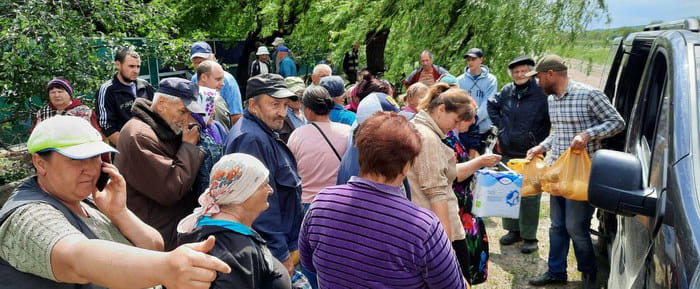
"It was impossible to prepare for February 24th. We have never worked on the scale we are now doing - either in terms of the number of people on our team or in terms of the amount of aid distributed," says Yuliya Krasilnykova, executive director of the foundation.
Yulia and most of her team members come from the Luhansk and Donetsk regions, the epicentre of the full-scale invasion of the Russian army these days. They are experiencing the events personally. Three of the four cities where they previously concentrated their work - Rubizhne, Severodonetsk, and Mariupol - have been occupied and destroyed by the Russians. In the first days of the war, the foundation evacuated to Uzhhorod in western Ukraine.
Before the full-scale war, Vostok SOS focused on two spheres of activity. Currently, it works in virtually all regions of Ukraine, providing humanitarian aid to residents of settlements on the front-line and displaced persons, arranges housing, and evacuates people. Since the beginning of the war, they have rescued over 25,000 people, including some with reduced mobility. The flow of evacuees has slowed down in recent weeks. However, with the expected Russian offensive against the densely populated areas of Donetsk (as well as a possible counteroffensive by Ukraine in the south), the foundation predicts a new wave of evacuations.
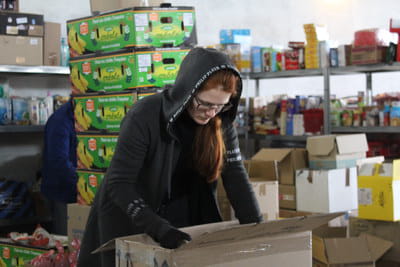
"Many more people live in the Donetsk region than in Luhansk, and we are puzzled about what to do with them. Where can we relocate them?" says Yuliya Krasilnykova.
Many internally displaced Ukrainians live in schools which children are to attend in September. People will need new housing. The problem is acute.
According to the latest International Organization for Migration report, over 6.2 million internally displaced people remain in Ukraine.
Vostok SOS also provides psychological support and legal advice through a hotline, and it documents war crimes.
This is important.
Even the greatest evil must face justice, including before an international court.
Natalia Kaplun, an experienced documentalist, says that back in 2014, it was difficult to imagine the terrible crimes currently being committed by the Russian military: "The war has become completely different. I have a feeling that Putin managed to restructure his army, to make it capable of bombing targets with the inscription ‘Children’ and of destroying entire cities of civilians."
According to Natalia, only the tip of the iceberg of Russian crimes is visible now. Therefore, this detailed work needs support and strengthening.
Putin's eight-year war in the east has already created substantial humanitarian problems for Ukraine, but now, says Yulia Krasilnykova, there is even more work, and that will take decades. The main thing is to survive the current crisis.
"Unfortunately, Ukrainians do not have the opportunity to get tired of the war. It is in an acute phase and it is not clear where it will move," the activist says.
Story No. 2
"They even sent "rape kits"
23-year-old Tonya Zamyshliaeva from the Luhansk region has been living in Lviv for a month in a shelter for war refugees. She is waiting for documents: a passport to go to Europe, and from there to Russia for a short time to see her mother, who has stayed in occupied Luhansk.
"We cannot meet up in Ukraine for obvious reasons. And we can't meet in Europe since she doesn't have a passport. That's why we decided to go to St Petersburg," the young woman explains. After reuniting with her mother, she plans to go to the Netherlands and possibly start looking for a job there.
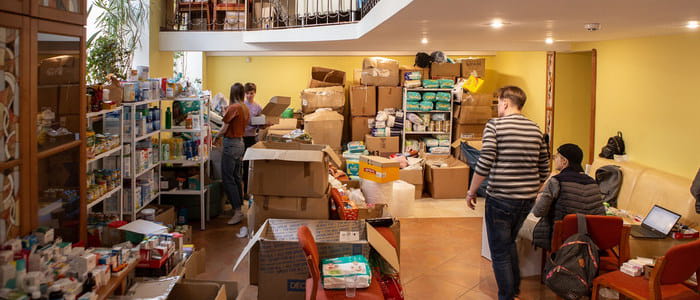
We met Tonya at the humanitarian hub, which belongs to the feminist initiative Women’s March and the LGBT organization Insight, where Tonya is volunteering while waiting for her passport to be issued.
These organisations run the shelter where Tonya and 15 other people live: women who fled the war and LGBT people. Refugees get food, medicine, legal support, and, if necessary, help to reach the border. A similar shelter operates in Chernivtsi.
Women's March is a feminist initiative.
Before the war, it organised actions that drew attention to the problems of Ukrainian women and promoted the Istanbul Convention, which Ukraine ratified in June 2022.
Currently, Insight activists are fully focused on helping vulnerable women fleeing war and LGBT people. And the kind of help needed can be depressing. For example, in one of the regions, the women sent "rape kits" to collect evidence of the crime...
From Lviv, they are constantly sending aid to the regions with the most immigrants: from hygiene items, medicines, and hormones to carrycots with strollers.
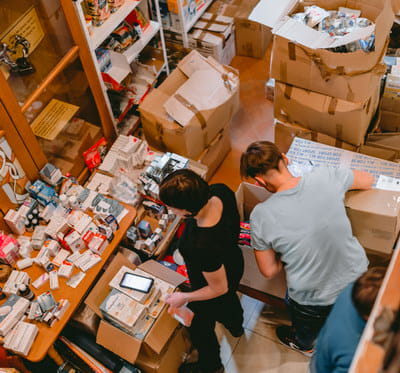
All humanitarian aid is sent in response to applications made via a Google form.
They say there is enough work for two dozen female volunteers. "In the first days of the war, surprisingly, we received very few applications. And now, if the Google form is open for half an hour, we receive up to 200 applications," notes Khrystyna Senchenko, the hub coordinator.
The organisation also sets up free therapy and psychological support services. Women who have become victims of domestic violence are the main users of these services. Their number has increased significantly due to the war.
Since the beginning of the war, the Women's March received over 11,000 applications from women in need, of which the foundation has processed about 10,000. There is no labour shortage to handle these volumes. The main challenge has been the donation drop.
"People are exhausted. And people abroad are exhausted. They are tired of hearing bad news about Ukraine," says Senchenko. The lion's share of the donors comes from abroad. Khrystyna emphasises: in Ukraine, people tend to donate for ammunition and the army, and this, on the one hand, is the right approach. However, many people cannot afford basic things like pads or diapers, and we should keep this in mind.
Story No. 3
Half a million hostages who need help
"I am the mother of four children. We live under occupation. There is no work. The prices have gone up terribly," says Inna from Kakhovka, in the Kherson region. Russian troops entered her city in the first days of the war.
Inna is one of the thousands of mothers whose families found themselves on the edge of survival in the Kherson region. She asked for help from the Zakhyst foundation in Kherson. She bought products for herself and her children from the 3,400 hryvnias she received (less than 100 dollars at the current ruthless exchange rate).
Kherson region is a completely occupied region of Ukraine. There have been no safe "green corridors" either for evacuating civilians or for delivering humanitarian aid since the beginning of the war. International organisations have repeatedly called on the occupation authorities to open access, but in vain. There are two ways out of the occupied area, but both are difficult and dangerous. Some drive straight across the front line, risking being killed. Others leave via Crimea, which is occupied by Russia, making a detour of 4000-6000 kilometres and returning to Ukraine through the Baltic states or Poland.
Many people cannot take such a path. They stay under occupation.
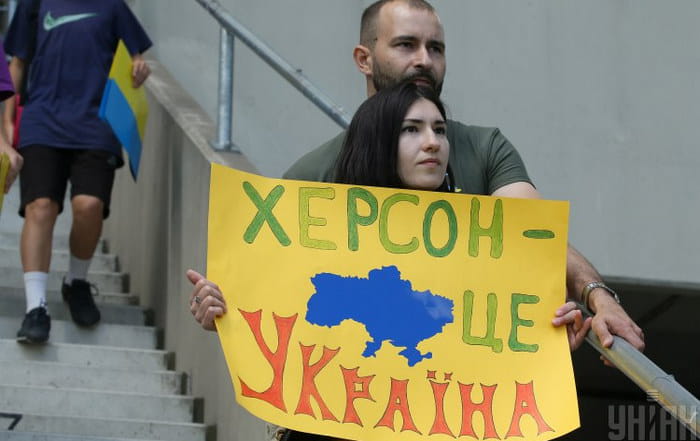
In May, the Ukrainian authorities reported that since the outbreak of the war, the population of the Kherson region had fallen by half, but about 500,000 people remain there. Many of them have lost their jobs and source of income. International humanitarian organisations that help those in need are completely absent here.
"We applied (online) to various foundations. Most of them either did not respond or said they did not have the means to deliver aid to our region," said Olena, a resident of the Kherson region. She is a mother of many children. Her husband is disabled.
In the fifth month of the war, Zakhyst is focusing on a single goal - supporting families with many children and families raising children with disabilities. "Social benefits in the Kherson region are difficult. There is no work. The entire Kherson region needs support, especially families with children," explains Tetiana Shkodivska, the foundation's communications manager.
At the beginning of the war, Zakhyst tried to support local hospitals, but this effort did not last long. Due to the hostilities, it was difficult to transport goods to the Kherson region safely. Some of the medicines were looted by the Russian military.
During the war, the foundation transferred funds to 657 families with children. But at Zakhyst, they say: this is a drop in the ocean. About 1,300 more applications are on the waiting list. It is more difficult to help because the number of donations is dropping. In July, the foundation reduced the aid by a third, even lower than the current living wage. Zakhyst hopes that donors will not leave the people of Kherson alone with their problems.
Help the Kherson community foundation Zakhyst
Story No. 4
"All children in Ukraine have suffered from the war"
The volunteer and chair of the board of the Voices of Children charity foundation, Olena Rozvadovska, was thinking, back in February, about how to update the need for support to Ukrainian children affected by the war in Donbas.
She had been working with the issue for many years and felt that people were tired.
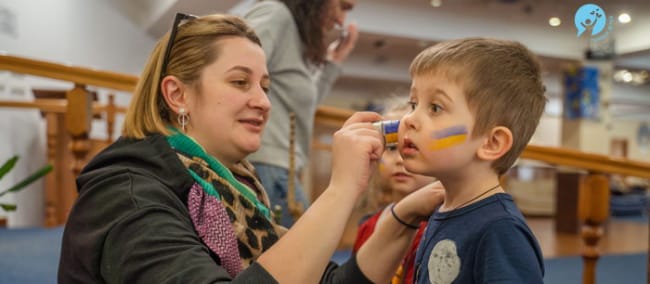
It was tough in the last two years, with COVID-19. It seemed that not everyone was up to it. But with the full-scale Russian invasion, there was no longer any need for explanations.
The experience gained with the children of Donbas has become helpful for all of Ukraine.
"On February 24th, unfortunately, we did not have to update anything. All children in Ukraine have suffered from the war in one way or another. The father may be in the army, or they may be living in a city where air raid sirens are constantly going off," says Rozvadovska.
Compared to previous years, the amount of work has now expanded: from 10,000 children living along the front line in the Donetsk and Luhansk regions who needed support, the number of children affected by the war has increased to millions. According to UNICEF, over 2 million Ukrainian children have become refugees and fled abroad. Another 3 million children are internally displaced.
Five Ways to Help War Victims in Ukraine. Guide to Donate to Local NGOs
Voices of Children focuses on psychological and psychosocial support. This includes art therapy programmes, mobile teams of therapists, and a therapy hotline. But since the war has been destroying children's homes and cities, the organisation is now helping families settle in a new place and meet basic needs.
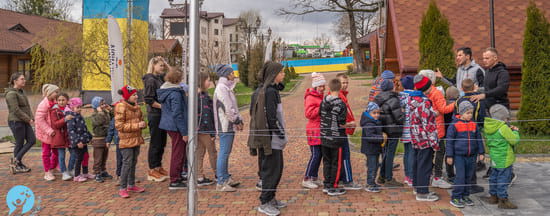
In order to cope with their many tasks, they have had to increase the team tenfold. The volume of philanthropic work is enormous because the opportunities to receive psychological support from the state are limited.
"This is a service that, unfortunately, the Ukrainian state does not have in the quality and quantity needed. Qualified therapists are something we will need to train in the requisite quantities," explains Rozvadovska. First Lady Olena Zelenska has launched a governmental initiative to make psychological support available to every Ukrainian. However, it is only a project, and millions need help now.
Help the Voices of Children foundation
Story No. 5
"None of the doctors were ready for war"
Fighting cancer under shelling is an almost impossible task. The Zaporuka Foundation has been saving the lives of children with cancer for 14 years. So with the beginning of the full-scale war, it continued to fulfil its mission.
It evacuated the children with the most complicated cases abroad.
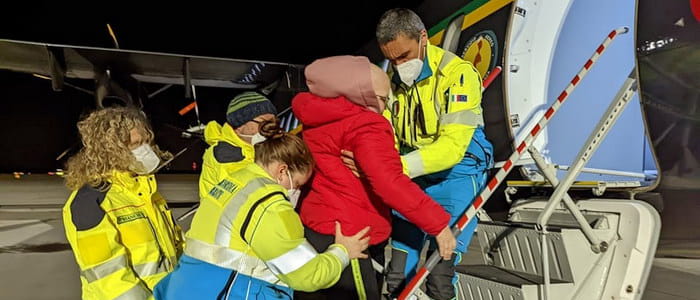
First, they evacuated children from the Dacha centre near Kyiv's Zhulyany airport, a strategically important area for the fighting and therefore extremely dangerous. Then, they evacuated children from the National Cancer Institute. "Later, we were approached by hospitals from all over Ukraine - from Dnipro to Western Ukraine. They had children with difficult cases whom they could not help because of the war," says Natalia Onipko, the founder and president of Zaporuka.
After war broke out, it was possible to evacuate about a hundred young patients with their families to Italy. The foundation is still in touch with them and continues supporting them. "We believe the child’s family is very valuable, and it is what keeps us going," Onipko explains why they did not evacuate children abroad without their relatives.
With cancer patients, the foundation takes care of doctors, equipping them with expensive equipment and consumables. Before the war, Zaporuka was patron of three medical institutions: the National Cancer Institute, the Institute of Neurosurgery, and the West Ukrainian Specialized Children's Medical Center, where one of the main projects was the opening of the first transplant clinic in Western Ukraine.
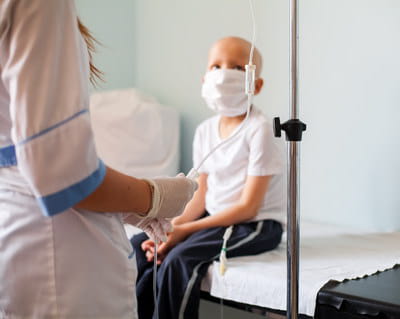
With the war, all Ukrainian hospitals need more support.
So now, the foundation supports, among other institutions, hospitals in Dnipro, Kryvyi Rih, Kharkiv, and Pokrovsk.
In Lviv, the foundation looks after the St Mykola Hospital, which accepts children injured by shelling. It turned out that the hospital needed materials but also expertise. So the foundation involved a well-known Italian surgeon, a specialist in severe wound treatment. He performed surgery and trained Ukrainian doctors. "None of the doctors were ready for war and did not know how to treat some unusual wounds," explains the president of Zaporuka.
The foundation's plans include:
- Continuing to support the provision of psychological assistance.
- Opening a rehabilitation centre in Lviv.
- The long-dreamed-of and now almost completed support centre for children with cancer and their families in Kyiv.
They would also like to create housing for internally displaced persons. In the fifth month of the war, temporary shelter has become a critical problem. "Housing should not be temporary, but permanent, so that people can settle down. Many have nowhere to return. Even if it is a small but individual dwelling, one that people could be responsible for," Natalia Onipko adds.
Of course, these are not the only foundations working in Ukraine and helping Ukrainians who have found themselves under pressure from the biggest and most aggressive war since WWII.
We have picked very different examples and hope we have helped you and your friends to decide how exactly to help Ukraine. Choose the one you like best. But all of them need your support.
The piece is published with support of Foundation International Communications Hub (FICH) та CommsHub Ukraine